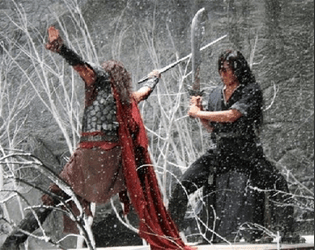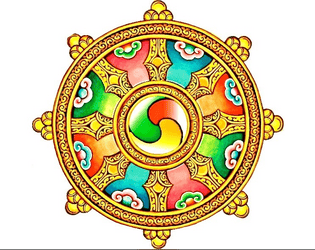thanks!
kingCrackers
Creator of
Recent community posts
‘Flying Dutchman’ Prominence (Username: 鼠哭雀嚎)
“Everyone here is a pilot." -looks down- "I’m like the only one who’s not a pilot.”
Attached To: Zeus Imperative Service (technically defunct)
Ship-Self: Scavenger-Scout Jatayu-Falls-To-The-Earth (‘Jatayu’ for short, it’s okay, honest)
Needs: Hydrogen, oxygen, organic fodder to turn into sustenance, sun light, salvage sites
Wants: To Break Free
A first generation operator assigned to clear the battlefields of salvage and debris in a ship-self designed to conduct self-repair, Prominence’s unsavory work earned him the status of a doom-portent; and his craft, the reputation of a ghost ship, to be avoided at every turn. Alienation made truth of the rumors, and now a gravity mutant and his ramshackle life support system must sail through space alone, and cannot make dock or else risk death.
(copied from my blog, which is way easier than just writing a new bio; my character for my fate core: camelot trigger game set after one of the endings in 'heaven will be mine'; not mentioned in the bio: extremely bi)
For ten long years, one sword I whetted,
Its frosty edge, as yet, untried.
Today, I hold it unsheathed before you;
Of you, to whom was justice denied?
~Jia Dao: (The) Swordsman
i keep using this poem because it's so good for my purposes. EDIT: let's break it down line-by-line;
- Cultivate your conduct. Take all the time in the world. But do it. Whet that sword.
- Steel in your heart, fire in your belly, ice in your veins. You contain multitudes. You contain a world.
- Consent. Make sure you know what the people need.
- Justice. The first word and the last curse.
Under Heaven, Underworld
Passion, vendetta, and justice; a wuxia game set in the modern day, with the world outside your window.
https://hungryghostgames.itch.io/underheavenunderworld
Hi, yes, this is my baby, a result of about ten years of on-and-off work and orphaned projects. Player characters portray martial arts experts of incredible fighting and aesthetic prowess, and they wander the seedy underworlds of places that the players draw from their memories, feuding with other martial artists, protecting the weak, and speaking for the voiceless. Players determine their characters' emotional states to roll and produce narrative currency, which is spent to perform actions in a stressful situation. Group combat is your typical 'roll against each other' fare, but one-on-one combat involves a 'Rock, Paper, Scissors, Lizard, Spock' set-up that I hope has weight and plays out fast.
Now available for playtesting.
point one: no, i believe you are mistaken. glacus is not basing the idea that narrative language should be mechanically weighty; "immersion" or inhabiting a mindset or otherwise roleplaying is usually a fiat thing. and fiat is the furthest thing from concrete; interacting with emotions, beliefs, and motivations in a concrete way will require mechanics - narrative in nature - that make these things matter.
point two: sure, i'm saying that as a gm, that these players do exist, because i play with them. and that one day you might have to deal with their desires, and they may not intersect with yours (the horror!). which leads me to the last point.
point three: of course the gm is also a player. of course they should also have fun at the table. but when someone wants something different, you're going to have to deal with it. you must decide whose enjoyment is going to win out. and you can save yourself a lot of grief by preparing for it.
a "beat" is a unit of narrative time, part of a larger rhythm, and it comes from musical notation. basically put, you put beats in the storytell so not everything happens at once, or so things don't just keep happening without pause. in any 'random game', as you put it, a beat is just an event that happens in the story. you hit the upbeat, then you hit the downbeat. you spend a session fighting the vampire lord, then you spend a session deciding what to do with all the blood. in one scene you play the boxer in the ring for the title championship bout, in the next you play the boxer celebrating their victory or mourning their loss.
i'm not a particular fan of the three-act; i prefer to improvise the narrative structure of my campaigns. but just because i improvise, doesn't mean i don't spend a lot of thought, work, and time on the structure.
here's why you should follow that whim; because your players asked you for it. what else are we here for?
and I mean, if it has never happened to you, maybe it'll never happen, and you won't have to learn anything new.
I get what you're trying to say with "plundering plot points and tropes," but you are unequivocally wrong. a story is a living thing, and the play is the pumping of the blood. plot points and tropes cannot be plundered, and those are but the components of a story to begin with. the story matters. the gold and treasure may go into a fictional economy, but I have never heard of it as a system mattering aside from fiat. if there's a game out there concerned with GDP and the actual flow of goods, I will retract my criticism.
and I mean, it doesn't need to matter. if all you want is for players to get lots of money to buy the things they like, there's no reason why you have to calculate deficits to determine this quarter's sales tax.
finally, being able to inhabit a character's mind and being aware of tropes, clichés, and other narrative conventions are not mutually-exclusive positions.
i decided to make an original system because no other system could offer me exactly what i wanted; long, involved combats with quickly-resolved rounds, the ability to express character personality in a very specific mechanical way, the rewarding of playing according to narrative themes by consensus. lots of games had one or a few but not all.
the biggest challenge is making it do exactly what you want is difficult, and you have no idea if it works. or if it only works for you. you're wading through unexplored territory, and no amount of conventional wisdom can prepare you for where you need to go.
the biggest advantage is that you are wading through unexplored territory; conventional wisdom does not apply. it's freeing because nobody can tell you what you should be doing.
cross-posting because why not:
i would appreciate some critique on 'under heaven, underworld'. i really like the idea of generating currency to purchase fictional effects, and i'd like to be directed to other games that do similar things and how they balance things from a moment-to-moment basis. another issue i have is duel combat; i haven't playtested it but i'm hoping that it will be nice and fast. any other tips on language, tone, politics, etcetera would be appreciated.
open or private, i'm fine with whichever one you folks pick.
hi, i'm j.y. singaporean-chinese 27 bi cis man. i've been interested in trpgs for 15 years, and been playing/making them for the past 10 or so. i think. i love the focused design of small games and the longevity of the larger, traditional fare. games that inspired me the most have been fate core, apocalypse world, and exalted. i also play dnd sometimes, grudgingly.
my current project is 'under heaven, underworld', a modern wuxia game with an original system.
find me on twitter at @king_crackers, on discord as kingcrackers#1379, and my email address is thedamnedseamonster@gmail.com











